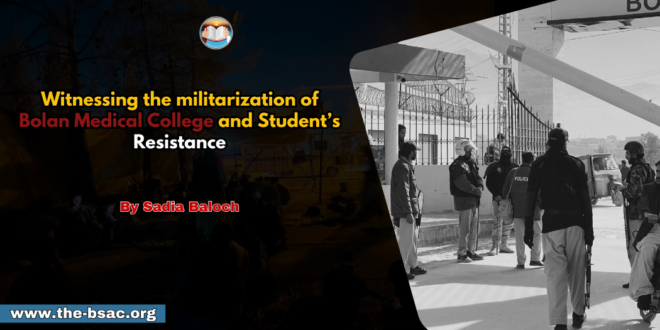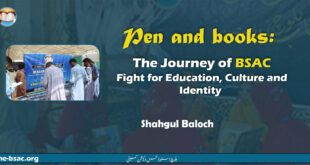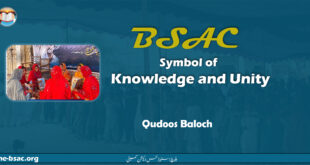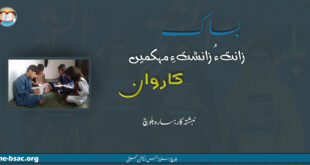Witnessing the Militarization of Bolan Medical College and Student’s Resistance
By Sadia Baloch
On the 12th of November 2024, after classes, I went to my room and decided to rest. As soon as I fell asleep, the sound of gunfire and screams jolted me awake. Curious about the commotion, I went up to the hostel terrace. The ground was swarming with police officers baton-charging and pelting stones at the boys in the hostel while firing tear gas and live rounds. Police vans were parked outside the hostel gate, and any student they caught was brutally beaten with sticks and thrown into prisoner vans.
It was heartbreaking to witness such brutality against students who had traveled long distances to pursue their education. The state’s actions were not just a response to a fight; they were a declaration of power, a reminder that we, the students, had no place in their vision of a controlled society. I turned to a friend nearby and asked what had happened. She explained that a fight between two students had escalated to this, prompting the police to forcibly vacate the boys’ hostel.
I was shocked. How could a fight between two students justify evacuating an entire hostel? By then, the tear gas had spread, stinging my eyes and making it hard to breathe. We retreated indoors. My eyes burned so much I couldn’t open them properly. One of my friends soaked her scarf and handed it to me, saying it would help ease the irritation. Another friend informed us that several students had been arrested and urged us to go to the main gate to prevent the police from taking them away.
In that panicked state, we rushed to the main gate and locked it to stop the police from leaving with our detained peers. We were not just fighting for the release of our detained peers; we were fighting for the right to be heard, to be seen, and to be acknowledged as human beings. Soon, prisoner vans packed with arrested students arrived at the gate. We demanded their release, but the police threatened to arrest us as well.
One of our female companions stood right in front of a police officer, insisting on the release of the detained students. The police responded by firing tear gas shells toward the gate, creating chaos. Amid the commotion, male officers dragged our friend away and threw her into a police van. Watching our friend dragged away was a moment of utter helplessness. It was as if our voices, our protests, and our existence were being silenced all at once. The boys following the vans erupted in anger at the sight.
The tear gas at the main gate made it impossible to see or breathe. When even breathing becomes a struggle, you realize how deeply the state’s violence penetrates—down to the very air you breathe. I was gasping, unable to see clearly. Someone gave me water to drink and wash my eyes, which eased the burning slightly, but breathing remained difficult. Another friend suggested sniffing spirit to help. After doing so, I managed to regain some composure.
That day, the state seemed determined to crush anyone who resisted—whether through violence or detention. The police had turned merciless. The violence we faced wasn’t just physical—it was psychological, a calculated attempt to break our spirit and make us believe that resistance was futile. While state institutions are supposed to serve the people, the inhumane treatment of students was unjustifiable.
Eventually, the police broke through the gate and took away our detained peers. By then, evening had fallen. Members of the BSAC (Baloch Students Action Committee) decided to block the road in front of BMC in protest, demanding the release of the detained students. But just as the state had stripped us of our right to education and residence, it also denied us the right to protest. It became clear that in this state, even peaceful resistance was a crime worthy of punishment.
The police fired not only tear gas but live bullets at us and even pelted stones. When even peaceful protest is met with bullets and brutality, what remains of justice? What remains of humanity? That night, the stretch from Brewery Road police station to Golimar Chowk turned into a battlefield. Wherever we tried to protest, the police retaliated with force.
When we blocked Golimar Chowk, the police sped their vehicles toward us, attempting to run us over. Those standing in inaccessible spots were not spared either. It seemed the police had been instructed to crush us under their vehicles and were perhaps even promised rewards for doing so. Even ordinary citizens faced the brunt of this brutality.
We realized this wasn’t a simple escalation but a deliberate state plan. Otherwise, a mere fight between two students would not have led to this. We were not just resisting brutality; we were resisting the erasure of our rights, our identity, and our future.
The police began arresting more students from the area. I saw an officer press the barrel of his gun against a student’s neck and drag him to a police van. That night, not only students but also shopkeepers and shoppers were subjected to tear gas and arrests.
The police was discriminately chasing and arresting Baloch Students. Later that night, the police returned to the boys’ hostel and sealed it. Many students, having been forced to evacuate, left behind valuable belongings like mobile phones, laptops, books, and blankets. The police looted everything. Mobile phones and laptops were looted by police in a large amount.
Students from remote areas were left stranded with nowhere to go. I understood their plight; the state had even stripped us of the basic right to study in peace. I wondered, why was the pursuit of education perceived as such a threat?
The next day, the administration announced the closure of the girls’ hostel. The decision made no sense—it was based on a fight between two boys. Police officers surrounded the girls’ hostel, ready to force us out. In protest, we locked the gates from inside and refused to leave. However, notices were sent to our families, threatening them. Ultimately, we were forced to vacate.
Two weeks later, after no action from the administration, The BSAC and other students organizations set up a protest camp to demand the reopening of BMC and the hostels. In Balochistan, rights are never granted without protest. Protests have always been our only tool, a beacon of hope in a system that thrives on silencing dissent. The camp continued for a long time.
The sit-in protest was organized at 27th Nov 2024, in response to the administration’s inaction, BSAC started holding classes in Balochi and Brahui at the camp, lasting for hours each day. Education became our resistance, a powerful act of resistance against the state’s attempts to shut us down. The camp was like a school for us where we learnt and discussed various topics and explored through the secrets of the world.
Despite the freezing cold nights in Quetta, it was decided to continue the protest camp. Despite the temperature dropping below freezing, their determination never wavered, their books in hand. Every day, we discussed a new topic, exploring it from various angles. This continued for 28 days. It’s truly a fact that we learn the most during the toughest of times.
Those 28 days were an awakening for me. The intellectual growth fostered by the camp was invaluable. This month-long protest camp nurtured a kind of intellectual growth that holds immense value for me. We were seemed to be in a class room beyond the traditional and banking educational system.
When protesters decided to move the camp to the Balochistan Assembly and gave the college administration a three-day deadline, the principal finally approached us and agreed to our demands. An agreement was reached. But in Balochistan, agreements are just ink on paper, rarely respected and always at risk of being torn apart by those in power.
Just as Atta Shad College Turbat, Balochistan University, and BUITEMS have been militarized, they intend to turn BMC into a haven for security forces, leaving the Baloch perpetually fearful. After BMC, they won’t stop; they’ll take over every educational institution, turning them into bases for security forces to create a paralyzed mindset. A mindset devoid of critical thinking, resistance, or hope—a society stripped of its identity and bound by fear.
This issue isn’t just about BMC; it concerns the entire Baloch nation. BMC has always been a beacon of hope for our people. If it is militarized, it is the Baloch who will suffer the most. The state doesn’t want us to attain the awareness needed to uplift our community. They aim to paralyze us in every way, instilling fear and suppressing us. The state’s greatest fear is an educated Baloch, one who can think critically, organize, and challenge its narrative.
If the administration fails to meet our demands, the students will stage a sit-in at the Assembly. All they want is peace at educational institutions so students can continue their education without fear. This fight is not just for education—it’s for survival, for dignity, and for the right to shape our own futures.




